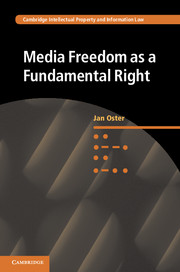Book contents
- Frontmatter
- Contents
- Preface and acknowledgements
- Table of cases
- Treaties, Conventions, Declarations and Statutes
- Reports and other documentary sources
- Introduction: aim, scope and method
- Part I The theoretical foundations of media freedom
- Part II General rules on media freedom
- 3 Beneficiaries of media freedom: who is ‘the media’?
- 4 The content of media freedom: media speech privileges and institutional protection of the media
- 5 The notion of an ‘interference’ with media freedom
- 6 Justification of an interference with media freedom
- Part III Specific limitations to media freedom
- Conclusion: tenets of a Media Freedom Principle
- Bibliography
- Index
- Cambridge Intellectual Property and Information Law
5 - The notion of an ‘interference’ with media freedom
from Part II - General rules on media freedom
Published online by Cambridge University Press: 05 June 2015
- Frontmatter
- Contents
- Preface and acknowledgements
- Table of cases
- Treaties, Conventions, Declarations and Statutes
- Reports and other documentary sources
- Introduction: aim, scope and method
- Part I The theoretical foundations of media freedom
- Part II General rules on media freedom
- 3 Beneficiaries of media freedom: who is ‘the media’?
- 4 The content of media freedom: media speech privileges and institutional protection of the media
- 5 The notion of an ‘interference’ with media freedom
- 6 Justification of an interference with media freedom
- Part III Specific limitations to media freedom
- Conclusion: tenets of a Media Freedom Principle
- Bibliography
- Index
- Cambridge Intellectual Property and Information Law
Summary
The concept of liberty is intrinsically tied to the notion of interference. The notion of ‘interference’ with human rights and the need for its justification are thus general themes common to all jurisdictions. In order to establish an interference with media freedom, two components of the notion of interference have to be distinguished: first, the obligated addressee of media freedom (‘interference by whom?’) and, second, the manifestation of an interference (‘interference through what?’).
The obligated addressee of media freedom
It is inherent in the concept of human rights that they run against the state, not against private persons. In international human rights law, this becomes clear with a view to the fact that states have signed up to international human rights treaties, not private companies or individuals. Article 10(1) ECHR thus provides that the right to freedom of expression ‘shall include freedom to hold opinions and to receive and impart information and ideas without interference by public authority’ (emphasis added). Article 2(1) ICCPR stipulates that ‘[e]ach State Party’ undertakes to respect the rights recognised in the Covenant (emphasis added). In the same vein, Article 1 AfCHPR obligates the Member States of the AU to recognise the rights enshrined in the Chapter, and Article 1 (1) ACHR places the States Parties to the Convention under an obligation to respect the rights and freedoms recognised therein.
Freedom of expression and media freedom are therefore binding on all branches of the state (executive, legislative and judicial) and all parts of federal states. The state is accountable for acts of all its organs, agents and servants, irrespective of their rank. This also includes private bodies, if a state holds a dominant stake in such an entity or if it exercises elements of governmental authority.
- Type
- Chapter
- Information
- Media Freedom as a Fundamental Right , pp. 102 - 109Publisher: Cambridge University PressPrint publication year: 2015



